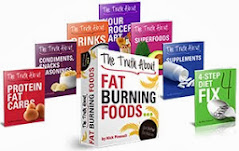In my house there's a phrase I hear quite often...
"Oh, my back hurts!"
Why?
Because my dear old husband, Stewart, suffers from back pain... just like more than half of all adults in the western world.
Yes, we can lay some blame on college football and a desk job that keeps him seated for more than 8 hours a day. But there are a lot of factors that make the situation worse and, luckily, a lot of things that can be done to make the situation better.
One thing Stewart always does say is when he's eating really well, and staying away from "junky" foods his back feels much, much better. (What do you mean? Isabel's husband doesn't eat perfectly all the time?) Nope, definitely not (sorry sweetie, I just ratted you out).
Some people would say this may be because the more weight you're carrying around on your body, the more strain you are putting on your back. Yes, this is probably true, but my husband is not overweight, so there must be something else to this.
Whats the reason?
Inflammation.
Specifically internal inflammation and this kind of inflammation can be greatly controlled by the food you eat.
Internal inflammation is a lot like external inflammation but you can't see it so it is not as obvious to us. When you sprain your ankle, your body's natural response is to signal pain (so you won't keep moving and cause more damage) and will also cause inflammation in the injured area (again, so you'll just lie on the couch and chill out). It will also direct fresh blood, antibodies, and vital cells to the area to aid in the healing process. This sounds all fine and dandy but when your body creates inflammation and pain signals in your lower back, sometimes debilitating you for the day, it is not so fine and dandy anymore. Like my husband, you may have experienced this before.
I have had plenty of people look at me like I was crazy when I tried to tell them that if they just eliminated "inflammatory foods" from their meal plans, a lot of the pain would go away. Especially medical professionals who have been so accustomed to just prescribing surgery or pain medications to alleviate bad backs. But I have seen it happen right before my eyes time and time again. People need to eliminate inflammatory foods like wheat, dairy and sugar, and voilà
...Back pain gone in a few weeks.
So what kind of foods should you avoid and which foods should you eat to control and prevent back pain?
Foods to avoid to control and eliminate inflammation (i.e. inflammatory foods)
Sugar, from any source
Processed foods
French Fries
Fast Foods
White bread
Pasta
Ice Cream
Cheddar Cheeses
Snack Foods
Oils such as vegetable and corn
Soda, caffeine and alcohol
Foods to eat to control and eliminate inflammation (i.e. anti-inflammatory foods)
Atlantic Salmon (wild)
Fresh whole fruits, vegetables
Bright multi-colored vegetables
Lean poultry
Nuts, legumes and seeds
Dark green leafy vegetables
Old fashioned oatmeal
Green tea
Water
Olive oil

